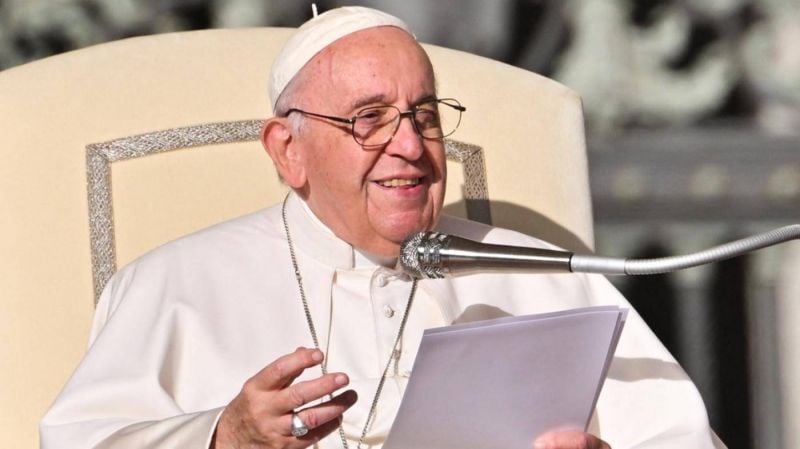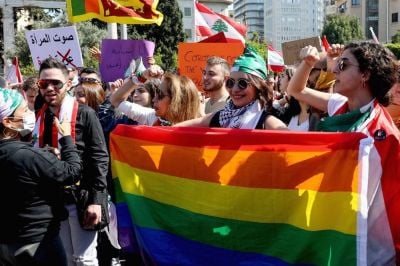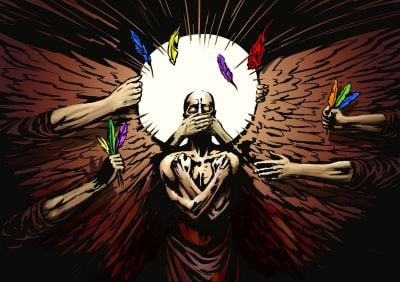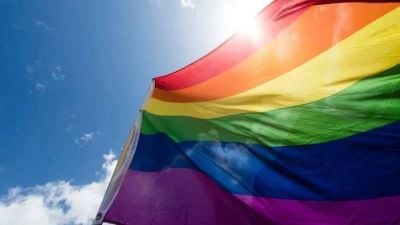
Pope Francis. (Credit: AFP archives)
In a Jan. 24 interview with the Associated Press, Pope Francis said “being homosexual is not a crime,” but cited official teachings of the Catholic Church declaring same-sex activity to be “sinful.”
“Let’s distinguish between a sin and a crime,” he said. “It is also a sin to lack charity with one another.”
The pope clarified his remarks in a statement on Jan. 27, saying that he “was simply referring to Catholic moral teachings, which say that every sexual act outside of marriage is a sin.”
In the same AP interview, Pope Francis called on Catholic bishops to welcome LGBTQ people into the church. He reiterated this during a visit to South Sudan on Feb. 5.
He noted that bishops in some parts of the world, including Africa and the Middle East, support “unjust” laws that criminalize homosexuality or discriminate against LGBTQ people.
The Pope attributed such laws to culture, adding that these bishops need to initiate a process of change and recognize the dignity of all, because “God loves all his children just as they are.”
The Pope’s words were met largely with disagreement from the Lebanese Catholic leaders who spoke with L’Orient-Le Jour, while local LGBTQ+ rights group, Helem, said it “welcomes” the renewed conversation.
A recent investigation by L’Orient-Le Jour detailed multiple accusations of harmful “conversion therapy” courses run by Lebanese churches and other religious leaders targeting LGBTQ+ individuals.
Lebanese officials have also cracked down on public events and gatherings by LGBTQ+ groups in the past year.
Nevertheless, the Pope’s comments could spark an important public dialogue around LGBTQ+ rights in Lebanon.
“This is not the first time the Pope has expressed sentiments that recognize LGBTQ people as human and that try to maintain their dignity in the face of the historical and still ongoing onslaught by the institution of the church,” Tarek Zeidan, director of Helem, told L’Orient-Le Jour.
“If members of the clergy are willing to talk, then we are obviously willing to both talk and listen based on compassion and truth, not mythologies,” he added.
Protected under the law?
The Pope’s stance on same-sex relations was rejected by Father Abdo Bou Kassem, director of the Catholic Center of Information, who called it “foreign” and “unnatural.”
Extra-marital relationships of all forms are considered sinful by the Catholic Church. “If the laws of a country consider it a crime, how is this our business?” asked Kassem.
Although not explicitly illegal in Lebanon, Article 534 of the penal code is sometimes used to criminalize LGBTQ+ relationships.
The measure “prohibits any sexual intercourse that contradicts the law of nature,” which is punishable by a prison sentence of up to one year.
Article 534 aside, LGBTQ+ people have been arbitrarily targeted by authorities for extortion and harassment, L’Orient Today previously reported.
During June pride last year, caretaker Interior Minister Bassam Mawlawi issued a decree instructing security services to shut down any LGBTQ+ events during the month. A coalition of rights groups condemned the move and the State Shura Council later overruled his decision, but that didn't stop Mawlawi from issuing a similar decree in November.
According to Kassem, as long as Lebanese bishops have not been summoned by the Pope to take action, there is no reason to open a discussion with the state authorities to decriminalize same-sex relations.
Father Kassem said people in same-sex relationships “are free to make their own choices, and the Church must take them under its wing and treat them with love like the rest of the faithful … But there is a difference between respecting individual freedom and promoting a way of life that a minority seeks to impose on everyone.”
To Zeidan of Helem, Lebanese law is already obliged to respect LGBTQ+ rights, despite previous rulings or viewpoints from the religious sphere.
“The institution of the church uses queer people in order to justify increasing crackdowns that deny people their rights,” he said.
“When I say ‘rights,’ I don’t just mean the Geneva Declaration and other bodies of international law, I also mean the rights enshrined by the Lebanese Constitution and Lebanon’s recent acceptance of the freedom of assembly and right to healthcare for LGBTQ people.”
Never the right time
Father Claude Nadra, general director of the Assembly of Maronite Bishops, agrees with Kassem.
“We cannot, under the pretext of defending freedom, take away the freedom of others, nor force them to believe what we believe in,” he said. “The Church strives to recognize the dignity of every person, following the principle that man and woman were created in the image of God.”
Father Nadra called for discernment when it comes to Pope Francis’s latest remarks:
“I agree with the Holy Father, but only up to a point. We cannot ignore the local context. Europe has experienced great upheavals recently, but given the situation in Lebanon, the Church and society should unite to find a collective identity, instead of going towards minorities.”
Speaking to L’Orient-Le Jour, Father Georges Hobeika, professor of philosophy and president of the Holy Spirit University of Kaslik (USEK), criticized what he characterized as excessive personal freedom.
“Humanity has been in disarray since the human being was put on the pedestal of absolute freedom,” he said.
A law to guarantee individual freedoms
Breaking uniformity with the statements made by these Lebanese Catholic representatives, Latin bishop Cesar Essayan, the Apostolic Vicar of Beirut, offered an alternative perspective:
“We must put an end to the criminalization of homosexuals. There is nothing wrong with being who you are,” said Essayan, who was directly appointed by Pope Francis.
“Homosexuality is certainly a sin in the Catholic teaching, but beyond that, it is necessary to take into consideration the history of each person and to accept each individual, in the search for a greater communion with the Lord,” he said.
In harmony with the position of the Pope, Bishop Essayan called for the abolition of unjust laws against the LGBTQ+ community in Lebanon.
“If the Church says no to gay marriage, the state should be able to … ensure full citizenship for all,” said the Latin bishop, who advocates for a non-sectarian civil state.
“I don’t agree with the way the LGBTQ issue is treated in Lebanon. Every being is defined in their humanity, and in their uniqueness.”
The Latin bishop of Beirut added he is convinced the Church has a role to play in freeing people of sectarian constraints.
“I’m very pleased that an internal conversation has begun in the church,” added Helem’s Tarek Zeidan.
“We hope that it will lead if not to acceptance in our time, then at least curiosity to meet with LGBTQ people, particularly LGBTQ people of faith, who have been struggling for centuries having their priests telling them that their very existence is a sin and that they are not worthy of the love of God or the love of their community.”
This article was originally published in French in L'Orient-Le Jour. Translation by Joelle El Khoury.



